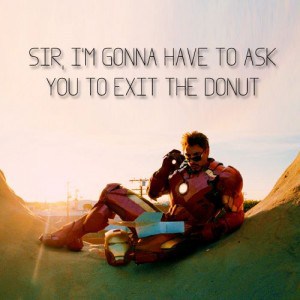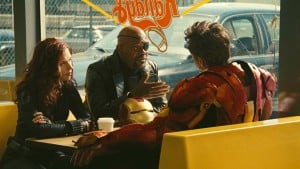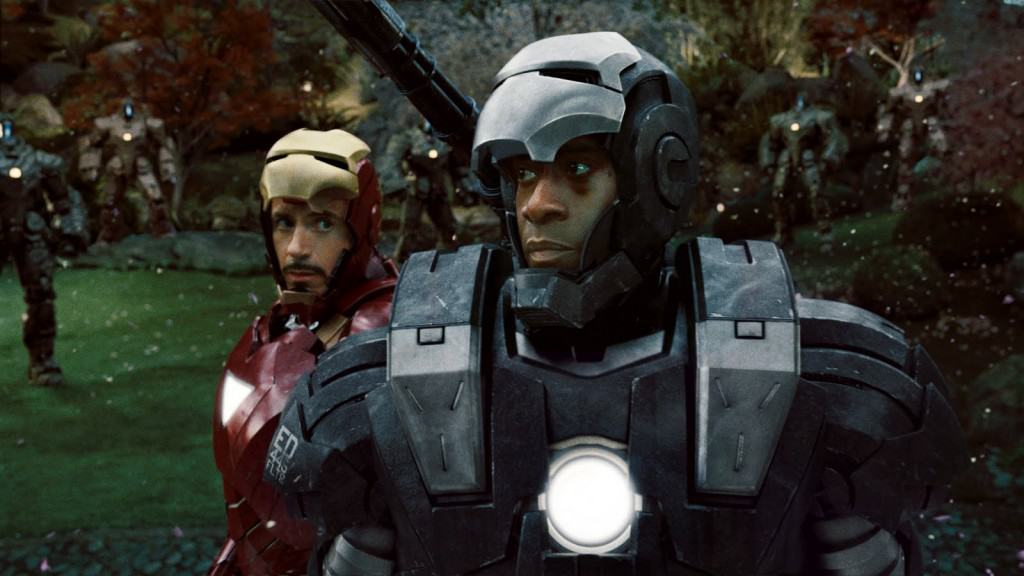This exploration of Iron Man 2 is the fourth in a series of posts exploring theological themes in the Marvel Cinematic Universe. You can find the rest of the series here. I recommend using VidAngel to filter the content of this film for your family.
Every part of Tony Stark seems to have been forged in brokenness.
A fractured relationship with his father birthed the man known as Tony Stark. According to Tony’s recollection of his father,
He wasn’t my biggest fan. … He…never told me he loved me, never even told me he liked me. You’re talking about a man whose happiest day…was shipping me off to boarding school.
Tony Stark the machine was born in brokenness as well. The Iron Man suit was made to save a heart broken by one of Tony’s own inventions. In this second film of the Iron Man trilogy, the machine has—in some sense—merged with Tony Stark’s human identity to form a new man with a new heart. In Tony’s own words,
I am Iron Man. The suit and I are one. To turn over the Iron Man suit would be to turn over myself, which is tantamount to indentured servitude or prostitution, depending on what state you’re in. … It’s a high-tech prosthesis.
The Riddle of the Heart in Iron Man 2
In the second Iron Man film, many of the more despicable aspects of the old Tony Stark continue to fade under the weight of this new conglomeration of machine and man.
But the new man now faces a new dilemma.
Tony Stark’s life still depends on a palladium-powered reactor that keeps shards of shrapnel from piercing his broken heart, but the palladium in the reactor is poisoning him. Self-created saviors always become our executioners, and this one is no different. The dying son’s only hope for survival will require him to listen to the voice of his long-deceased father, seeking a legacy that has remained a secret for nearly two decades. Yet time is running out, and one of his father’s enemies wants to destroy the Stark legacy once and for all. Tony Stark must solve the riddle of his own heart, but his “heart is deceitful above all things. … Who can understand it?” (Jeremiah 17:9).
“This Lone Gunslinger Act Is Unnecessary”: The Isolating Impact of the Fall
Much like the first Iron Man film, Iron Man 2 offers no dreams of a paradisiacal past. Tony’s continued pursuits of pleasure and his claims to have achieved peace turn out to be the empty gasps of a dying man. “Fallaces sunt rerum species,” triple-agent Natasha Romanoff quips at one point in the film, quoting the Roman philosopher Seneca. “Appearances are deceptive,” and this is true not only when it comes to Natasha’s multiple identities but also to Tony’s self-indulgent proclivities.
The new Tony Stark still flouts authority, flaunts his accomplishments, and ogles every skirt in sight. Yet, as the film unfolds, it becomes clear that these performances bring no lasting peace or pleasure. They are flimsy barriers, gossamer veils flung up by a broken man in an empty attempt to shield himself from his own pain. “I’ve successfully privatized world peace,” he blusters in a congressional hearing, but there is no true peace either within him or around him.
Tony Stark works feverishly to solve the dilemma of his poisoned heart, but he does so in isolation. “This lone gunslinger act is unnecessary,” Colonel Rhodes reminds him. Yet Tony refuses to admit his brokenness or his need for assistance. When it becomes clear that the healing of his heart is beyond his best efforts, Tony Stark turns over his company to Pepper Potts and tries to convince her to run away with him to Venice. He risks—and nearly loses—his life on a racetrack. Yet he still refuses to reveal what is happening inside him.
The element that is both sustaining him and killing him is palladium—a real-world element that’s encased in your car’s catalytic converter. But the Latin word palladium also carries another meaning. In ancient times, the palladium was an image that protected a city or a nation from harm. This is precisely the role that Tony Stark claims for himself early in the film: “I’m your nuclear deterrent. It’s working. We’re safe. America is secure.” The graven image known as Iron Man has become the divine protector of his nation. And yet, as Tim Keller has pointed out, there is no human being who “can bear the full weight of godhood”—not even a human being inside a super-powered suit. Iron Man pretends to be sovereign over his nation’s airspace. Yet he is powerless to remove the poison in his own heart, and he is unwilling to reveal his brokenness to others. This is the way that the poison of sin works within each of us. “Sin”—Dietrich Bonhoeffer wrote in Life Together—
demands to have a man by himself. It withdraws him from the community. The more isolated a person is, the more destructive will be the power of sin over him, and the more deeply he becomes involved in it, the more disastrous is his isolation. Sin wants to remain unknown. It shuns the light.
Alone with secrets that shun the light, Tony Stark spirals deeper and deeper into darkness.
 “I decided to cheer myself up with wine and have a good time,” the author of Ecclesiastes recalled as he looked back on his younger years (Ecclesiastes 2:3), and Tony makes the same decision on what he believes will be his final birthday. But he drinks to excess, and the bottle brings him no delight, only degradation and destruction. Inebriated and unwilling to listen to those who care about him, Iron Man becomes the fool whose “mouth invites a beating” (Proverbs 18:6). He fights the friend who has risked his reputation to save him, and he reduces his own house to shambles. In the end, the prodigal flies away to a far country—which, in this case, happens to be an iconic sign on top of a donut shop in Inglewood. There, SHIELD director Nick Fury utters one of the movie’s more memorable lines: “Sir, I’m going to have to ask you to exit the donut.”
“I decided to cheer myself up with wine and have a good time,” the author of Ecclesiastes recalled as he looked back on his younger years (Ecclesiastes 2:3), and Tony makes the same decision on what he believes will be his final birthday. But he drinks to excess, and the bottle brings him no delight, only degradation and destruction. Inebriated and unwilling to listen to those who care about him, Iron Man becomes the fool whose “mouth invites a beating” (Proverbs 18:6). He fights the friend who has risked his reputation to save him, and he reduces his own house to shambles. In the end, the prodigal flies away to a far country—which, in this case, happens to be an iconic sign on top of a donut shop in Inglewood. There, SHIELD director Nick Fury utters one of the movie’s more memorable lines: “Sir, I’m going to have to ask you to exit the donut.”
 In the parable that Jesus told about a lost son, the prodigal “came to himself” when he found himself starving in a pigsty (Luke 15:17); Tony Stark comes to himself in the shadow of a concrete donut and in the shattered remains of his ruined mansion. There, Nick Fury hands him a crate filled with film reels and makes it clear that Tony Stark’s only hope for salvation will require the lost son to make his way back to his father.
In the parable that Jesus told about a lost son, the prodigal “came to himself” when he found himself starving in a pigsty (Luke 15:17); Tony Stark comes to himself in the shadow of a concrete donut and in the shattered remains of his ruined mansion. There, Nick Fury hands him a crate filled with film reels and makes it clear that Tony Stark’s only hope for salvation will require the lost son to make his way back to his father.
“My Greatest Creation is You”: Redeemed through a Return to the Father
Howard Stark has been dead for nearly twenty years, so it is through the medium of film that Tony hears his father’s voice again. The film reels from Nick Fury reveal the secrets that Tony Stark needs to heal his broken heart, literally and figuratively. In one film reel, his father reveals the atomic structure of the element that Tony needs to repair the arc reactor. This elusive element brings new life to his physical heart.
But something else is hidden in the films as well.
Speaking through the film projector, Howard Stark declares to his son,
I’m limited by the technology of my time, but one day you’ll figure this out. And when you do, you will change the world. What is and will always be my greatest creation … is you.
Nearly two decades after his demise, the failed father has finally declared to his fallen son the words that every human being longs to hear: “You are my beloved son. In you, I am well-pleased.” These are the words that Tony Stark needs to sustain the healing of the heart that no one sees.
Not only does Tony Stark synthesize a replacement for the physical element known as palladium, but he also—by bringing Rhodey alongside him as War Machine—replaces himself as the perceived palladium of his country. Tony’s relational transformation is less thoroughgoing than his recognition of his limitations as Iron Man, but it is no less real. Tony Stark moves from lecherous gazes and profligate promiscuity into a “stable-ish relationship” with Pepper Potts—but perhaps that’s the most we can expect from the playboy that Stan Lee created to occupy the Iron Man suit.

“If You Could Make God Bleed”: The Death of False Deity in Iron Man 2
The nemesis of Iron Man in battle is Ivan Vanko, the son of a scientist who worked with Howard Stark on the original design for the arc reactor. Yet Vanko is not the film’s true antagonist. Vanko is a mere foil to highlight the flaws of the film’s most menacing villain: the ego that drives Tony Stark to place upon his own shoulders the mantle of deity.
“If you could make God bleed, people would cease to believe in him,” Ivan Vanko tells Tony Stark after unmasking Iron Man’s vulnerability before a watching world. “There will be blood in the water, the sharks will come. All I have to do is sit back and watch as the world consumes you.” Vanko does indeed make Iron Man bleed, but he is not consumed. In his bleeding brokenness, Tony Stark recognizes his weakness and recovers his humanity; this becomes his salvation.
Vanko was right about Tony Stark and every other object that we set up in the place of God. When these false deities and demigods break and bleed, people cease to believe. When it comes to the Triune God of the Christian Scriptures, however, Vanko could not have been more wrong. On a splintered beam outside Jerusalem, this God did indeed bleed. Through his bleeding, he triumphed over our brokenness and walked out of his own tomb alive and well. If you make a false god bleed, yes, people cease to believe. If you make the real God bleed, it is because he chose to bleed, and what you end up with is an empty grave and a kingdom that no human hand can crush.
What theological themes do you see in Iron Man 2 that I may have missed? How does the vision of Iron Man in the Marvel Cinematic Universe differ from the comic books? How have the later films in the Marvel Cinematic Universe changed your perspective on this first film?


